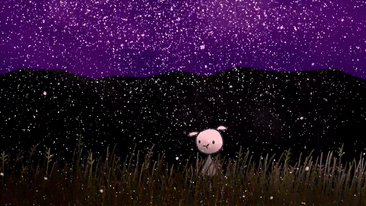B+ | A futuristic clone introduces her young ancestor to the various ways that humanity has adapted to death. Directed by Don Hertzfeldt Starring Julia Pott and Winona Mae Initial Review by Shane Setnor |

Well, at least in the future it seems reasonable to think that dying, as we know it, will no longer exist. Blair and I have often had a conversation about uploading our brain into computers by the time we’re old. It’s a very intriguing possibility in my opinion, though Blair seems less enthused. Just thinking of the possibility is where my thought exercise ends. Don Hertzfeld, however, gives us 16 minutes of heartfelt melancholy and absurd sci-fi that shows that technology isn’t what is interesting about the future, but how it changes humanity is the question.
This makes me reflect on the loss I’ve experienced in just 34 years. Of course, this always leads back to Geoff passing away at a far too young age. Despite all the good memories and the passage of time smoothing out the edges of his death, there’s still a hole in my heart (or soul or consciousness – however you view it). This feeling, of course, is part of what make us human. We miss the past. We miss people and long for more time with them. With more time in this existence, we’ll face more potential misery as well. Future Emily drives the point home with, “I am very proud of my sadness, because it means I am more alive.”
This line resonates with me every time I’ve watched this short film, which is probably in the double digits at this point.
It flips my thoughts of the future on its head. The promise of ever-lasting life and amazing technology is supposed to be a promise that is entirely comforting and happy, but it turns out we’re still human, even when we try to tamp out the “negative” aspects of humanity (dying and the erosion of our bodies). The pain I feel from Geoff’s passing is a real part of me that I would never trade in. I wouldn’t want a future where that emotion was stripped from me, so Hertzfeld’s bizarre future works on me from a relatable level.
This is a testament to a well-crafted story that doesn’t allow Hertzfeld’s crude animations, his first foray into using computer animation instead of pencil and paper, distract from what is going on. In their simplicity and absurdity, the visuals add to what is really a pretty heavy story by giving us something that keeps the tone light and whimsical, despite the sad robots stuck forever roaming the moon for unknown reasons. (Again, the gift of immortality is seen as a curse when Future Emily recites the poem.)
The finishing touch of the story is a brilliant stroke by Hertzfeld. Earlier in the short, launching people too far into the past when time-traveling was played for laughs, one of a dozen visual jokes. Calling back to that moment and sending Emily Prime too far into the past fits in with the narrative that technology can’t save humanity from sadness and from itself. Emily Prime shivering in the past is equal parts funny, sad and thought-provoking because now I’m concerned about what happens to Future Emily and we’ve opened up a new bag of worms.
This short completely works on me. It can be harder to judge a short film for depth, but World of Tomorrow packs enough punch to give it the substance of a feature-length film. Every time, it leaves me wanting more.
A
 RSS Feed
RSS Feed